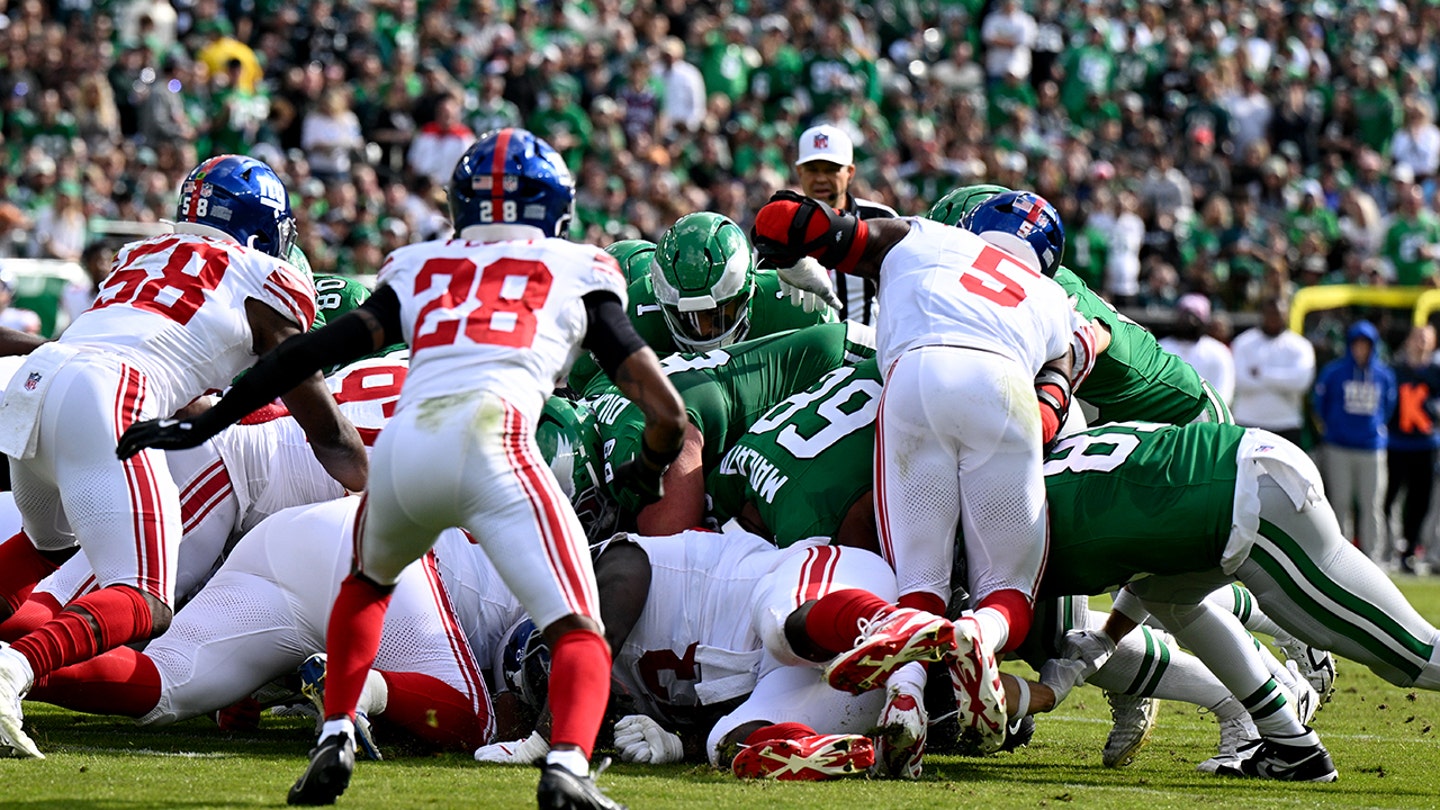
US Olympian and other fencers file class-action lawsuit against USA Fencing for alleged trans athlete incident
Entities mentioned:
- Margherita Guzzi Vincenti: Justice, Competitive spirit, Professional pride
- Emma Griffin: Fairness, Competitive spirit, Recognition
- Patricia Hughes: Legacy, Fairness, Professional pride
- USA Fencing: Self-preservation, Control, Obligation
- Damien Lehfeldt: Self-preservation, Control, Wariness
Article Assessment:
Credibility Score: 75/100
Bias Rating: 65/100 (Lean Right)
Sentiment Score: 35/100
Authoritarianism Risk: 30/100 (Generally Democratic)
Bias Analysis:
The article leans right due to its framing of transgender athlete participation as problematic and its focus on the plaintiffs' perspective. However, it does include a statement from USA Fencing, providing some balance.
Key metric: Gender Equality in Sports
Let me tell you something - this lawsuit is a GAME-CHANGER in the world of fencing! We're seeing a full-court press by these elite athletes who are stepping up to the plate and taking a swing at what they see as an unfair playing field. It's like they're in the fourth quarter of a championship game, and they're not about to let their hard-earned victories be snatched away! USA Fencing is on the defensive, trying to block this legal offensive, but these fencers are showing a true championship mentality. They're not just competing on the piste anymore, folks - they're battling in the courtroom arena! This is about more than just points and medals; it's about the very integrity of women's sports. These athletes are fighting with the heart of true competitors, determined to ensure a level playing field for the next generation of fencers. It's a high-stakes match that could redefine the rules of engagement in sports across the board!

Eagles great Jason Kelce says the difficulty of officiating the tush push would 'be a reason to ban it'
Entities mentioned:
- Philadelphia Eagles: Competitive spirit, Pride, Ambition
- Jason Kelce: Professional pride, Righteousness, Loyalty
- NFL Referees: Duty, Obligation, Anxiety
- New York Giants: Competitive spirit, Indignation, Determination
Article Assessment:
Credibility Score: 75/100
Bias Rating: 55/100 (Center)
Sentiment Score: 45/100
Authoritarianism Risk: 25/100 (Generally Democratic)
Bias Analysis:
The article presents multiple perspectives, including criticism of the Eagles' play and the referees. It balances opinions from both teams and former players, maintaining a relatively neutral stance.
Key metric: NFL Rule Enforcement Consistency
Let me tell you something - this story is RIDICULOUS! The Eagles' tush push play is causing more drama than a last-second Hail Mary! We've got a real battle brewing here between offensive innovation and the refs' ability to call the game. The Eagles are running this play like a well-oiled machine, but the officiating crew is fumbling the ball! It's fourth and inches in the rule book, and the league needs to step up to the plate and make a decision. Are they going to let this play stand or throw a flag on the whole concept? I'm telling you right now, this controversy has more twists and turns than a running back breaking tackles! The Eagles are playing chess while everyone else is playing checkers, but if the refs can't keep up, we might see this strategic play sacked for good!

US figure skater champion Alysa Liu opens up on being targeted by Chinese spying operation, FBI's protection
Entities mentioned:
- Alysa Liu: Determination, Competitive spirit, Enthusiasm
- Arthur Liu: Justice, Freedom, Security
- FBI: Duty, Security, Justice
- Chinese government: Control, Power, Influence
- Matthew Ziburis: Greed, Loyalty, Obligation
- USOPC: Competitive spirit, Unity, Professional pride
Article Assessment:
Credibility Score: 75/100
Bias Rating: 45/100 (Center)
Sentiment Score: 65/100
Authoritarianism Risk: 20/100 (Strongly Democratic)
Bias Analysis:
The article presents a balanced view of the situation, giving voice to multiple perspectives. While sympathetic to Liu and critical of Chinese actions, it maintains a neutral tone in reporting facts.
Key metric: Olympic Medal Count
Let me tell you something - this story is RIDICULOUS! We're talking about a young athlete who's not just facing competition on the ice, but in a high-stakes international game of cat and mouse! Alysa Liu stepped up to the plate with the determination of a true champion, refusing to let this curveball from the Chinese government knock her off her game. The FBI played outstanding defense, providing a rock-solid backline to keep Team USA's rising star safe. This is the kind of mental toughness that separates the contenders from the pretenders, folks! Liu's comeback is nothing short of a fourth-quarter miracle, shattering records and bringing home the gold for Team USA. I'm telling you right now, this is the kind of championship mentality that will have America dominating the scoreboard in Milano-Cortina!

LSU women's basketball star questions gov's push for school to erect statue of Charlie Kirk
Entities mentioned:
- Flau'jae Johnson: Justice, Self-respect, Righteousness
- Gov. Jeff Landry: Power, Influence, Ambition
- Charlie Kirk: Legacy, Influence, Recognition
- LSU: Obligation, Professional pride, Unity
Article Assessment:
Credibility Score: 70/100
Bias Rating: 55/100 (Center)
Sentiment Score: 35/100
Authoritarianism Risk: 40/100 (Generally Democratic)
Bias Analysis:
The article presents both viewpoints, quoting directly from Johnson and Landry. However, it leans slightly right by giving more context to the conservative event and Kirk's background.
Key metric: Political Polarization Index
Let me tell you something, folks - this is a CLASH OF TITANS on the political playing field! We've got LSU basketball star Flau'jae Johnson coming off the bench with a POWER MOVE, challenging the governor's game plan like a true champion. Governor Landry is trying to run a statue play for Charlie Kirk, but Johnson's defense is ROCK SOLID. This is fourth quarter politics, and the stakes couldn't be higher! Johnson's not just dribbling around the issue - she's taking it straight to the hoop with a slam dunk statement on discrimination. Meanwhile, Landry's trying to control the court with his Turning Point USA event, but Johnson's not falling for any fake-outs. This is the kind of political athletics that keeps fans on the edge of their seats, folks! The real question is: who's got the championship mentality to come out on top in this freedom of speech showdown?

California female athletes open up on alleged treatment from high school after filing Title IX lawsuit
Entities mentioned:
- Hadeel Hazameh: Justice, Competitive spirit, Self-respect
- Alyssa McPherson: Justice, Competitive spirit, Self-respect
- Jurupa Valley High School: Control, Obligation, Unity
- Liana Manu (Coach): Control, Duty, Professional pride
- Trans Athlete: Competitive spirit, Self-respect, Recognition
Article Assessment:
Credibility Score: 65/100
Bias Rating: 70/100 (Lean Right)
Sentiment Score: 30/100
Authoritarianism Risk: 35/100 (Generally Democratic)
Bias Analysis:
The article leans right by focusing heavily on the perspective of the athletes opposing transgender participation. It gives more space to their viewpoint and experiences, while providing limited context from the other side.
Key metric: Gender Equality in Sports
Let me tell you something, folks - this is a GAME-CHANGING play in the world of high school athletics! We've got two star players, Hazameh and McPherson, who've stepped off the court in a bold move that's shaking up the entire league. They're not just sitting on the sidelines, they're taking their fight to the big leagues with a Title IX lawsuit that could rewrite the playbook for girls' sports across the nation! This is a fourth-quarter strategy that's got everyone on the edge of their seats. The coach's decision to bench these players from even sitting with their team? That's a technical foul if I've ever seen one! We're watching a high-stakes match where the rules of the game itself are being challenged. It's not just about one season or one championship - this is about the future of the whole sport! The tension in that gym was thicker than the air in a locker room after triple overtime. These young athletes are showing a championship mentality, folks, standing up for what they believe in even when it means facing off against their own team. This is the kind of grit and determination that separates the all-stars from the bench warmers!

F1 driver Liam Lawson says he ‘could have killed’ marshals running on racetrack at Mexico Grand Prix
Entities mentioned:
- Liam Lawson: Safety, Professional pride, Indignation
- FIA: Control, Professional pride, Obligation
- Race Marshals: Duty, Enthusiasm, Anxiety
- Lando Norris: Competitive spirit, Ambition, Recognition
Article Assessment:
Credibility Score: 75/100
Bias Rating: 50/100 (Center)
Sentiment Score: 25/100
Authoritarianism Risk: 20/100 (Strongly Democratic)
Bias Analysis:
The article presents a balanced view of the incident, including quotes from Lawson and the FIA's response. It doesn't lean towards any particular side, maintaining a neutral stance on the issue.
Key metric: Athlete Safety in Motorsports
Let me tell you something - this story is RIDICULOUS! We're talking about a near-fatal fumble on the racetrack, folks! Liam Lawson, our rookie quarterback, was blindsided by two unexpected players charging onto his field. This is NOT the kind of Hail Mary pass we want to see in F1! The FIA, our league commissioner, needs to step up to the plate and lay down some serious rules before we see a tragedy. It's fourth quarter for track safety, and we need a game-changing play ASAP! Lawson showed true championship mentality by speaking out - he's not just racing for the checkered flag, he's fighting for the whole team's survival. Meanwhile, Lando Norris is running up the scoreboard, leaving his rivals in the dust. This is the kind of high-stakes, white-knuckle action that keeps us on the edge of our seats, but safety CANNOT take a back seat to spectacle. Wake up, F1 - it's time to get your head in the game!

NFL Reminds Players of League Gambling Policy In Light of Federal Indictments
Entities mentioned:
- NFL: Professional pride, Control, Integrity
- NFL Players: Self-preservation, Professional pride, Obligation
- Sean Payton: Duty, Professional pride, Wariness
- NFL Players Association: Protection, Duty, Obligation
Article Assessment:
Credibility Score: 85/100
Bias Rating: 50/100 (Center)
Sentiment Score: 40/100
Authoritarianism Risk: 35/100 (Generally Democratic)
Bias Analysis:
The article presents a balanced view of the NFL's actions and includes quotes from multiple sources. It objectively reports on the policy without taking sides, maintaining a neutral stance.
Key metric: League Integrity Index
Let me tell you something - this story is a GAME-CHANGER! The NFL is stepping up to the plate with a full-court press against gambling violations. They're not just running defense, folks, they're going on the offensive to protect the integrity of the game. This is a championship mentality from the league office, sending a clear message to players that they need to stay in bounds when it comes to betting. It's fourth quarter, two-minute drill time for the NFL to tackle this issue head-on. Players need to show that team-first mentality and avoid personal fouls that could jeopardize their careers and the sport's reputation. This is CRUNCH TIME for the league's integrity, and they're bringing their A-game to keep the playing field level and fair for all competitors.

Ted Cruz calls out Californians accused of jeering girls protesting volleyball game involving trans athlete
Entities mentioned:
- Ted Cruz: Righteousness, Moral outrage, Influence
- California residents: Pride, Indignation, Loyalty
- Teenage girl protesters: Justice, Determination, Self-respect
- Trans athlete: Competitive spirit, Recognition, Self-preservation
- Jurupa Valley High School: Competitive spirit, Professional pride, Obligation
- Valencia High School: Competitive spirit, Professional pride, Unity
- U.S. Department of Justice: Justice, Control, Duty
Article Assessment:
Credibility Score: 70/100
Bias Rating: 65/100 (Lean Right)
Sentiment Score: 30/100
Authoritarianism Risk: 35/100 (Generally Democratic)
Bias Analysis:
The article leans right due to its focus on Cruz's perspective and emphasis on protests against trans athletes. It presents multiple viewpoints but gives more weight to those opposing trans participation in women's sports.
Key metric: Gender Equality in Sports
Let me tell you something, folks - this is a FULL COURT PRESS situation! We've got a real slugfest brewing on the field of gender equality in sports. Senator Cruz is coming in hot, throwing some serious heat at these California fans who are playing dirty defense against young female athletes. But make no mistake, this is no ordinary game - it's a championship bout for the very soul of women's sports! The trans athlete stepped up to the plate, but Jurupa Valley High School struck out in straight sets. Meanwhile, we've got players leaving the court faster than a bench-clearing brawl. This isn't just a game anymore, folks - it's turned into an all-out legal scrimmage with lawsuits flying like Hail Mary passes. And now the Department of Justice is suiting up to get in on the action! I'm telling you right now, this is going into overtime and it's anybody's game!

Former cyclist Emma Pooley witnessed ‘unscientific bullying’ around food amid the sport’s high prevalence of eating disorders
Entities mentioned:
- Emma Pooley: Professional pride, Self-respect, Determination
- Cycling Industry: Competitive spirit, Control, Performance
- Union Cycliste Internationale (UCI): Duty, Obligation, Professional pride
Article Assessment:
Credibility Score: 85/100
Bias Rating: 45/100 (Center)
Sentiment Score: 30/100
Authoritarianism Risk: 20/100 (Strongly Democratic)
Bias Analysis:
The article presents a balanced view, including perspectives from athletes, experts, and governing bodies. It doesn't lean heavily towards any particular ideology, focusing on factual reporting of health issues in cycling.
Key metric: Athlete Health and Performance
Ladies and gentlemen, we've got a BOMBSHELL report from the cycling world! Former champion Emma Pooley is stepping up to the plate and calling out the RIDICULOUS pressure cooker environment in professional cycling. This isn't just a small-time scrimmage, folks - we're talking about a FULL COURT PRESS on athletes' health! The peloton has been playing a dangerous game, pushing riders to the brink with unscientific weight-loss tactics. It's like they're trying to win the Tour de France by fielding a team of STICK FIGURES! But Pooley is fighting back, showing the grit of a true champion. She's exposing the ugly underbelly of the sport, where team directors act like overbearing coaches micromanaging every morsel their players eat. This is a critical moment, sports fans - will cycling step up its game and protect its athletes, or will it fumble the ball when it comes to long-term health? The clock is ticking, and the whole world is watching to see if the sport can turn this ship around before it's too late!

NBA Hall of Famer Chauncey Billups denies wrongdoing after arrest in FBI gambling probe
Entities mentioned:
- Chauncey Billups: Self-preservation, Professional pride, Legacy
- Chris Heywood: Duty, Loyalty, Justice
- FBI: Justice, Duty, Control
- Portland Trail Blazers: Self-preservation, Professional pride, Obligation
Article Assessment:
Credibility Score: 70/100
Bias Rating: 55/100 (Center)
Sentiment Score: 30/100
Authoritarianism Risk: 35/100 (Generally Democratic)
Bias Analysis:
The article presents both the allegations and Billups' defense, showing a relatively balanced approach. It leans slightly right due to its source (Fox News) but maintains a largely neutral tone in reporting the facts.
Key metric: NBA League Integrity
Let me tell you something - this story is a GAME-CHANGER for the NBA! We're talking about a Hall of Famer, folks, a champion point guard now facing the toughest defense of his life! Chauncey Billups is in a fourth-quarter struggle against the FBI, and he's got to bring his A-game to beat these charges! The Trail Blazers have benched their star coach faster than a technical foul, showing they're not messing around when it comes to protecting the integrity of the game. This is a FULL COURT PRESS by the feds, and Billups is going to need every ounce of that championship mentality to come out on top. The league's reputation is on the line here, and they can't afford to fumble this play. It's crunch time for the NBA, and how they handle this could be the difference between a slam dunk for integrity or an air ball that damages the sport for years to come!